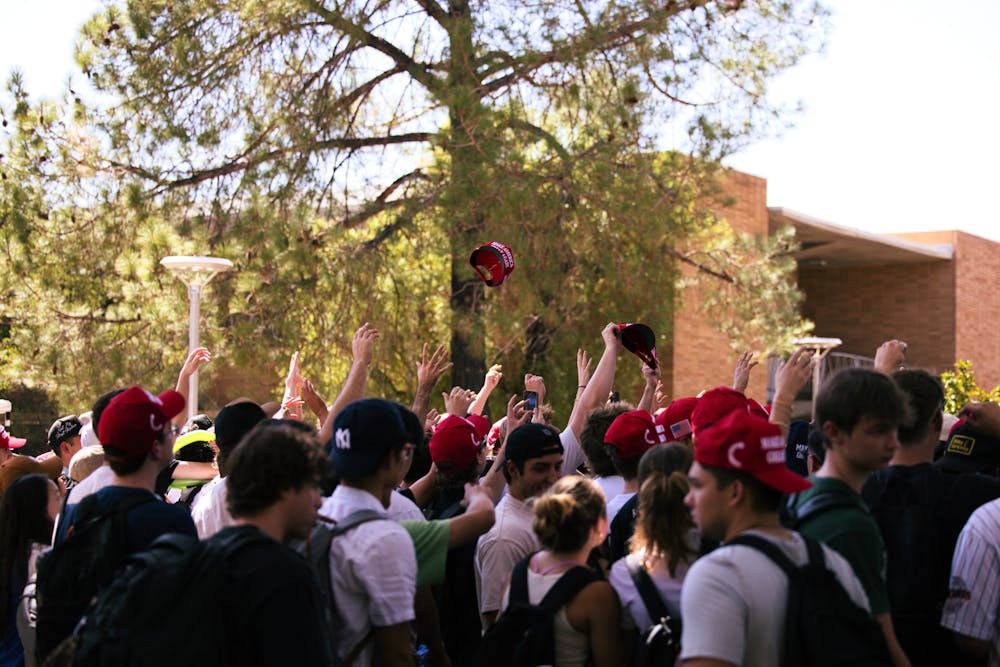As Election Day steadily approaches, swaths of political figures and celebrities have descended upon ASU. Since August, the likes of Charlie Kirk, Kari Lake, Donald Trump Jr. and Vivek Ramaswamy have visited the University, attending events that cater to a key demographic: Greek life.
The Republican personalities have made appearances at ballot parties along Mill Avenue, fraternity chapter meetings and voter registration drives.
For students on both ends of the political spectrum, the rise in political activism among the Panhellenic community is new, but not surprising.
"There's definitely a possibility of having all these events on campus, and even off campus, change the tide of the election, and it could swing in a different way. You never know," said Carson Carpenter, the president of College Republicans at ASU and a senior studying political science.
READ MORE: Kari Lake, Charlie Kirk visit ASU during 'Greeks for Trump' voter registration drive
In Arizona, the 2020 presidential election was decided by less than 11,000 votes out of about three million cast, a narrow 0.3%. At ASU, with an on-campus population of nearly 80,000 students, there are enough votes present to swing the election, Carpenter said.
Afonso Machado, a member of the College Republicans at ASU and a freshman studying political science, noted the connection Carpenter has started to build between the organization and Greek life. Machado believes the conservative movement is growing on college campuses, and will go "far beyond just a small club organization here at ASU."
With events popping up advertised with "Greeks for Trump" or branded with slogans like "Make Greek Life Great Again," this subsect of University culture is a notable cornerstone of Republican culture on college campuses.
For students such as Reilly Klug, a sophomore studying political science and public policy, opening a dialogue between differing political views within Panhellenic culture is important, but difficult during such a tenuous election season.
"If a woman in my sorority posts something I don't agree with, I'm never going to say anything," she said. "We are taught we have to keep this positive energy all the time."
To the contrary, Carpenter said the connection Greek life forges has the capacity to overpower political disagreements, and that open discussion is attainable. He cited "common respect and decency" as key tools to have these types of conversations rather than avoiding them.
"There's sisterhood and brotherhood at the end of the day," he said. "These political issues should not impact personal issues."
Klug, a member of Delta Gamma, described how being in a sorority in contrast to a fraternity brings more social pressure and unspoken rules. "If my sorority's Instagram posted 'Look at some of our members going to a Kamala Harris rally,' we'd get absolutely obliterated," she said.
Despite the current lack of partisan political discussions, she believes that sorority members would speak up if a figure they disagreed with was invited to an event.
"I feel like women in sororities will be less likely to go along with the pack," Klug said.
According to a September report by Axios, one of former President Donald Trump's target demographics this election cycle is the so-called "bro vote," characterized by young men who would be otherwise disaffected and uninvolved in politics.
This phenomenon is evident through Trump's recent non-traditional media appearances, including on several podcasts with a dominant male fanbase, such as This Past Weekend w/ Theo Von and The Joe Rogan Experience.
"It's honestly really disheartening to me that (political conversation) is so avoided, especially because I think obviously it's really important to talk about — it's going to affect all of us," Klug said. "But I also think that you can learn and grow so much from talking to someone who has a different viewpoint from you."
George Headley contributed to this report.
Edited by George Headley, Sophia Braccio and Natalia Jarrett.
Reach the reporter at agbeck1@asu.edu and follow @abbygisela on X.
Like The State Press on Facebook and follow @statepress on X.
Abigail is a senior studying journalism and mass communication. This is her third semester with The State Press. She has previously worked with News21, The State Press Magazine and The Arizona Republic.




